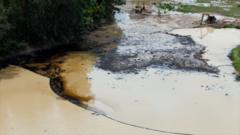Colombia's energy sector is under scrutiny as revelations emerge regarding extensive pollution linked to Ecopetrol, the country's main oil producer. A whistleblower, Andrés Olarte, has exposed over 800 environmental incident reports indicating a significant historical pattern of pollution involving oil spills affecting vital water sources and biodiverse wetlands. Data can be traced back to 1989 and suggests that the company has underreported about 20% of these events.
Ecopetrol (88% state-owned and listed on the New York Stock Exchange) asserts its compliance with Colombian laws and industry-leading sustainable practices, despite visible evidence of pollution from its refinery located on the Magdalena River, which supplies water to millions. Locals express concern over the impact of oil contamination on wildlife, citing dead manatees and the malodorous fish caught in the waterways.
Olarte, who worked as an advisor to Ecopetrol's CEO, states he challenged leadership about the pollution but met resistance, stating he discovered “awful” data on environmental damages. He claims that approximately 839 sites remain contaminated and some incidents were concealed from authorities. Despite the company denying the allegations, it acknowledges that significant work lies ahead regarding pollution management.
Local fishermen, represented by Yuly Velásquez, emphasize the crisis they are facing, claiming a “massacre” of local fauna and threatening livelihood as pollution rises. They have received threats, with reports of intimidation from armed groups surrounding the issues of environmental activism in Colombia, a country marked as perilous for environmental defenders.
Despite ongoing violence, including death threats toward Velásquez and Olarte, both continue to advocate for the environment. Olarte is currently involved in legal battles against Ecopetrol over its practices. Local and international environmentalists stress the need for accountability and transparency within the oil sector to combat the pressing challenges posed by pollution and protect vital ecosystems.
The situation highlights the conflict between economic reliance on oil production and the imperative for environmental stewardship, sparking debate on how Colombia can transition towards sustainable energy while safeguarding the rights and safety of community advocates.


















